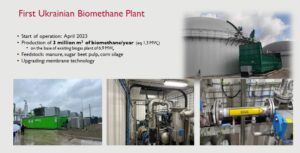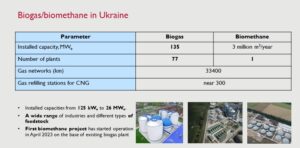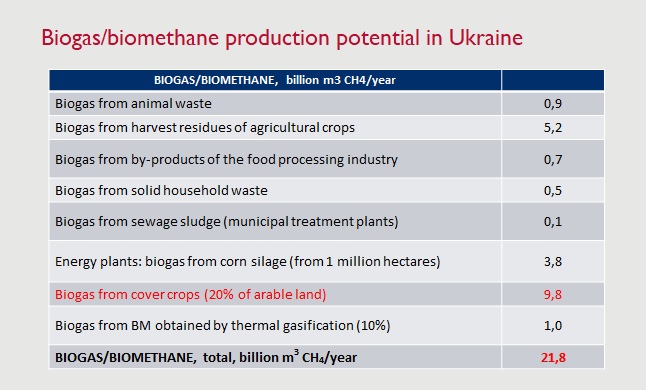 USAID’s ESP is building the capacities of stakeholders in the Ukraine energy sector in developing and trading renewable gases through the delivery of a comprehensive training program on biomethane. This week, ESP presented the biomethane project, which seeks to bring together key policymakers as well as agricultural and gas market players to ensure a common understanding of the full biomethane value chain. This includes how to turn agricultural wastes into valuable renewable gas and value-added products such as digestates (fertilizer).
USAID’s ESP is building the capacities of stakeholders in the Ukraine energy sector in developing and trading renewable gases through the delivery of a comprehensive training program on biomethane. This week, ESP presented the biomethane project, which seeks to bring together key policymakers as well as agricultural and gas market players to ensure a common understanding of the full biomethane value chain. This includes how to turn agricultural wastes into valuable renewable gas and value-added products such as digestates (fertilizer).
Kathleen Kirsch, Energy Team Lead of the Office of Economic Growth, USAID/Ukrainet, said about the workshop, “USAID through ESP continues to work across the gas, electricity, and heating sectors to provide secure energy supplies to Ukrainian people during Russia’s ongoing full-scale war. And we appreciate the long-standing and ongoing partnership with key Ukrainian energy sector stakeholders. ESP also focuses on the post-war recovery and reform of the energy sector, including the pathway to European integration and energy sector decarbonization. As such, the meeting today related to stimulating renewable gases and biomethane in Ukraine is crucially important.”
Justin Goonesinghe, Gas Sector Lead at USAID’s ESP further added on Ukraine’s capacity, “Being a large agricultural country with an equally big and well-developed gas pipeline system, Ukraine has good potential to develop this technology that can support economic growth, security of energy supply, and contribute to the decarbonization of the gas system in line with the European Green Deal.”
 ESP will conduct four workshops to present Ukraine’s biomethane value chain to discuss all aspects of the sector’s development. Through this capacity-building, ESP intends to give agricultural producers, energy traders, and policymakers the comprehensive technical skills and know-how to effectively produce biomethane and ensure its sustainability as a valuable and affordable energy resource for Ukraine.
ESP will conduct four workshops to present Ukraine’s biomethane value chain to discuss all aspects of the sector’s development. Through this capacity-building, ESP intends to give agricultural producers, energy traders, and policymakers the comprehensive technical skills and know-how to effectively produce biomethane and ensure its sustainability as a valuable and affordable energy resource for Ukraine.
The workshops will include a virtual tour of an existing biomethane plant and a final roundtable discussion on lessons learned and how to attract investments to develop a sustainable and low-cost biomethane sector. Participants will learn about Ukraine’s potential feedstocks for biomethane production, technology advancements in anaerobic digestion, and upgrading biogas for optimal biomethane production. In addition, ESP will give participants a foundational understanding of offtake agreements as well as the global best practices in carbon credits and offsets to amplify environmental and economic gains.
 Advantages of biomethane development in Ukraine:
Advantages of biomethane development in Ukraine:
- Biomethane is ready for injection into the gas network today. No investment is required to either modernize the gas networks (GTS and GDS) or buy gas equipment.
- Ukraine can compete with other countries in the production of biomethane by offering low-cost raw materials for biomethane production. In addition, the country has the largest area of agricultural land in Europe and, accordingly, has very strong potential to produce agricultural raw materials for biomethane production.
- Alongside generating biomethane for energy use, biomethane plants also generate digestate, which can become the main organic fertilizer needed to revive Ukrainian soils.
- Currently, biomethane is the least expensive of the possible renewable gases available in Ukraine.
- The EU has adopted ambitious plans to produce biomethane (REPowerEU) and set a target of 35 billion m3/year by 2030. Ukraine has the potential to significantly contribute to this need.
